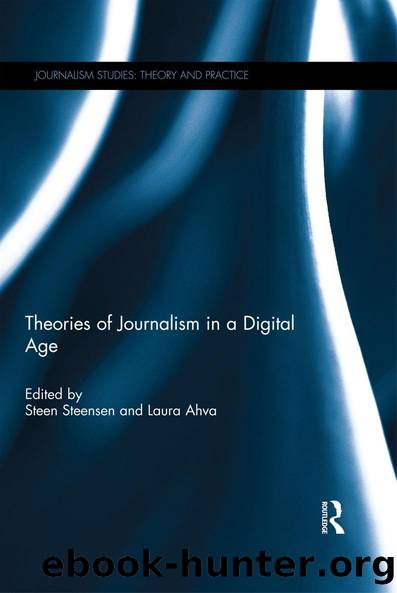Theories of Journalism in a Digital Age by Steen Steensen Laura Ahva

Author:Steen Steensen, Laura Ahva [Steen Steensen, Laura Ahva]
Language: eng
Format: epub
ISBN: 9780367029456
Barnesnoble:
Publisher: Taylor & Francis
Published: 2019-01-08T00:00:00+00:00
Mobile Technology Studies
In 2000, President Bill Clinton opened civilian access to GPS signals. This moment was instrumental because several companies saw the opportunity to use this to experiment with the possibilities of location with GPS devices and the mobile phone (Farman 2012, 19). Several experiments would lead to new innovations in the twenty-first century of how consumers would use their mobile phone for location-based services such as getting directions, for play (i.e. geocaching), and social networking (i.e. locative mobile social networking applications like Foursquare) (Farman 2012; Sutko and de Souza e Silva 2011).
Thus, the development of mobile technologies and location-based services nowadays plays an important role in todayâs society for helping consumers navigate their daily life but also how they make meaning of the places and spaces they travel through. de Souza e Silva (2004) states that mobile technologies are nomad technologies that create a hybrid form of space, âNomadic technologies are mostly used for communication connected to mobility ⦠Therefore, they become a part of our lives and also a part of our bodiesâ (de Souza e Silva 2004, 216).
As mobile and Web technologies advance, location-based services will become more pervasive in how people will understand and make meaning of the spaces in which they move, work, and play (Hardey 2007). Thus, there is a great need to examine and analyze the changes that location-based services have on society in a variety of contexts (Gordon and de Souza e Silva 2011). Sutko and de Souza e Silva (2011) state that location-based media studies are necessary to study at this juncture in communication scholarship because they help to extend existing theories of the virtual and real and reflect current communication phenomena of how individuals interact with each other and technology today.
The scholarship on location-based services is still fairly new. Studies thus far have examined the influence of geo-tagging and geo-location in various contexts, including social games (Licoppe and Inada 2006; de Souza e Silva and Sutko 2008; de Souza e Silva 2009), art displays in urban areas (Galloway and Ward 2006; Hemmet 2006; Hight 2006; Hudson and Zimmermann 2009; Levine 2006; Tuters and Varnelis 2006), and social networking (Humphreys 2007; Humphreys and Liao 2011). The impact of location-based services within the journalistic context has only been addressed in a handful of studies to date.
Nyre et al. (2012) developed a location-based news project called LocaNews that had two interfaces: one was a digital tool for people to access news on their smartphone, and the other a digital tool for the reporter to access via their smartphone in order to write the story and incorporate location into their story.
They tested the digital tool on 32 users in conjunction with a week-long event and observed the reporters and the public using the tool. Few people were able to understand how to view the news through this location format and the reporters had issues in categorizing and classifying news to a specific location. Nyre et al. (2012) had three versions of stories in the
Download
This site does not store any files on its server. We only index and link to content provided by other sites. Please contact the content providers to delete copyright contents if any and email us, we'll remove relevant links or contents immediately.
Index to the London Magazine by Frank P. Riga Claude A. Prance(200)
Female Impersonation by Carol-Anne Tyler(146)
Creativity and Feature Writing by Ellie Levenson(136)
A Filtered Life by Nicole Taylor Mimi Nichter(126)
Xenolinguistics; Towards a Science of Extraterrestrial Language by Douglas A. Vakoch & Jeffrey Punske(124)
Theories of Journalism in a Digital Age by Steen Steensen Laura Ahva(122)
Origin Of Ethnography In Japan by Minoru Kawada(118)
Critical Communication Pedagogy by Fassett Deanna L.;Warren John T.; & John T. warren(118)
Computing the News: Data Journalism and the Search for Objectivity by Sylvain Parasie(117)
Developing Translanguaging Repertoires in Critical Teacher Education by Zhongfeng Tian Nicole King(116)
Torture, Intelligence and Sousveillance in the War on Terror by Vian Bakir(114)
Peace Journalism in East Africa by Fredrick Ogenga(110)
Transformative Media Pedagogies by Paul Mihailidis Sangita Shresthova Megan Fromm(108)
Matter Transmission by Nicolás Salazar Sutil(104)
Revisiting Transnational Broadcasting by Nelson Ribeiro Stephanie Seul(101)
Media Studies 2.0 by William Merrin(99)
A Networked Self and Platforms, Stories, Connections by Zizi Papacharissi(97)
Media Audiences by Sue Turnbull(97)
The Gentrification of the Internet by Jessa Lingel(96)
